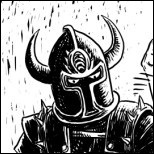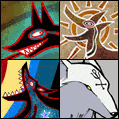|
Tuxedo Catfish posted:this attitude is dumb as hell, charop is fun lol charop can totally be fun, but it shouldn't allow you to break the game or to be utterly awful either. basically this: Comrade Gorbash posted:Frankly the idea that 4E took away the before/between session prep from D&D is laughable. It took out a lot of busy work, but 4E is still a pretty major time investment for the DM in terms of prep, and if anything making characters took longer in 4E than 3.x.
|
|
|
|

|
| # ? May 25, 2024 21:36 |
|
Mr. Maltose posted:Let me tell y'all the good word on Last Stand, the game where you literally draft your character's abilities. Somebody remind me what the policy is on distributing Last Stand, I know that Mikan quit elfgames and the internet for good reason but I recall that she put Last Stand up on a Google drive page or something that I lost track of, is it kosher to share it around or was it more of a backup for people who helped fund it?
|
|
|
|
Serf posted:lol charop can totally be fun, but it shouldn't allow you to break the game or to be utterly awful either. i think we're on the same page then 4E being the battleground of this particular conversation is really weird to me because it's almost the perfect example of what i'm talking about, there are lots of toys and doodads you can mess with to make a character that's a little bit stronger than everyone else or that mechanically expresses the narrative concept you like or whatever, while still keeping everyone within a well-bounded range of power it is neither a game where charop is non-existent nor one where it's runaway tedium
|
|
|
|
Tuxedo Catfish posted:i think we're on the same page then Eh, I found the sort of charop that I linked to tedious even in 4E. There's a difference between "which of these four distinct abilities would work best for my character" and "how can I plan out a 20 level build incorporating feats, gear, and other assorted stuff from across several books, to create a Ranger that can deal 96 damage to people every turn without even needing an attack roll."
|
|
|
|
most games, especially those in the vein of earlier and later editions of D&D are not as well-designed as 4e and allow you to take whatever options you like without punishing you too much
|
|
|
|
i think, for better or worse, older versions of D&D are outright designed for naive players maybe less so as you get into late-era 3.5 but even then WOTC printed tons of supplements full of classes that no power gamer would ever use, because they're flavorful trash at best e: i'm thinking of stuff like the swashbuckler which is basically just "what if fighter, but scaled with INT and couldn't use good armor"
|
|
|
|
Kai Tave posted:I used to think charop was fun when I was like 16 and the allure of adding stacks of numbers and selecting one of a dozen identical guns still had that new car smell to it. These days while I've accepted the fact that I'm basically an enormous waste of a human being I still value my time more than to want to repeat, say, the last time I made a Shadowrun character and it took me an accumulated five hours to do so. Honestly, after playing and running Shadowrun for so long, I am of the opinion that CharOp is poisonous bullshit that is actively the enemy of fun at the table. An optimized character has no way to grow or adapt in gameplay, and generally the player gets bored or butthurt if they cannot apply their optimized gimmick on a high percentage of game situations.
|
|
|
|
Liquid Communism posted:Honestly, after playing and running Shadowrun for so long, I am of the opinion that CharOp is poisonous bullshit that is actively the enemy of fun at the table. An optimized character has no wat to grow in game, and generally the player gets bored or butthurt if they cannot apply their optimized gimmick on a high percentage of game situations. i don't think charop is the source of either of the problems you're describing here
|
|
|
|
The former is in SR though, the way advancement works in various editions once you get a Big Number it's almost impossible to advance any further because of skill caps and karma costs. So you can't spend your advancement points on your optimized gimmick because you either literally can't or the advancement cost is so high you won't accumulate enough points in a year or more of play.
|
|
|
|
Kwyndig posted:The former is in SR though, the way advancement works in various editions once you get a Big Number it's almost impossible to advance any further because of skill caps and karma costs. So you can't spend your advancement points on your optimized gimmick because you either literally can't or the advancement cost is so high you won't accumulate enough points in a year or more of play. I didn't want to just say "it sounds like Shadowrun has a lovely advancement system" because I've never played Shadowrun, but, like, that sounds like a lovely advancement system. And players wanting to do what their character was built to do isn't a bug. It might be if the game makes you purchase "good at combat" stuff from the same pool as "good at narrative flavor" because then the heavily optimized character is probably also going to a really boring and pigeonholed character, but if that's the case, see above re: lovely advancement systems.
|
|
|
|
Tuxedo Catfish posted:i think, for better or worse, older versions of D&D are outright designed for naive players why would badly-designed classes be good for naive players? i mean it is impossible to calculate balance outside of 4e, but if you take your lovely class into a fight and get wrecked because the writer had no idea what they were doing that's not a fun time for anyone involved
|
|
|
|
moths posted:4e is a rocky example because it was so divisive, but I think it might be the best illustration. A lot of players with a background in prepwork style games were upset that there were restrictive mechanics explicitly designed to thwart repetitive play. I played tons of 4E characters that revolved around one at-will with tons and tons of riders on top. Our paragon battles lasted hours thanks to a huge number of stupid +1s and +2s added on top of at-wills. Dailies and encounter powers largely just added a weapon or two of damage. 4E had a shitload of charop. The same people who broke 3.5 were doing it in 4E and Pathfinder.
|
|
|
|
Serf posted:why would badly-designed classes be good for naive players? i mean it is impossible to calculate balance outside of 4e, but if you take your lovely class into a fight and get wrecked because the writer had no idea what they were doing that's not a fun time for anyone involved Not good for, but designed for. In the sense that monsters in D&D are not built on the assumption that you're squeezing every last drop of power from the system; rather, if you're squeezing every last drop of power from the system, you're just going to flatten everything. In other words the problem is less that you take a lovely class and get wrecked and more that if any one person takes a good class and takes the time to really understand it, they're going to completely destroy the difficulty curve.
|
|
|
|
Tuxedo Catfish posted:i don't think charop is the source of either of the problems you're describing here It absolutely is. There is a strong trend in the Shadowrun community to view characters as useless trash builds unless they can hit a threshold of dice pools in the high teens in their primary ability. This is way above the expected valus in the game design (as demonstrated by enemy dicepools) and requires building starting characters near to their practical maximum limits in their primary working dicepools. This means a player buidling something in line with the pregens, or diversifying their skills in any meaningful way, is going to be outclassed heavily and likely unable to survive the level.of challenge required to give the CharOp players any iota of challenge. It also means that the CharOp players are going to, in my experience, get intensely bored if I design scenarios to prevent them from spamming their 'I Win" button. I view CharOp at this point as a result of a player's desire to essentially not engage with one or more major game systems, and a reason to sit down with the player and have a discussion about what they're really looking for out of playing the game.
|
|
|
|
again, that just sounds like "Shadowrun sucks mechanically" A game where you have to intentionally limit your understanding and use of its systems in order to have a varied and interesting play experience is just a bad game.
|
|
|
|
Tuxedo Catfish posted:Shadowrun sucks
|
|
|
Mr. Maltose posted:Let me tell y'all the good word on Last Stand, the game where you literally draft your character's abilities.  beautiful bug game beautiful bug game  Kai Tave posted:Somebody remind me what the policy is on distributing Last Stand, I know that Mikan quit elfgames and the internet for good reason but I recall that she put Last Stand up on a Google drive page or something that I lost track of, is it kosher to share it around or was it more of a backup for people who helped fund it?
|
|
|
|
|
I'm in the camp that hates charop--not the basic principle of it, not really, I just hate doing it or having to worry about it. I really really hate trap options, because I always seem to be the one who thinks 'well that sounds kinda cool' only to find out the concept in fluff is not well-represented in play. It just isn't interesting to me, stacking up numbers and trying to merge all these bonuses and whatnot. Partly it's because I am far more interested in the characters and story in TT games, and partly because if I want to make numbers go higher, I have a lot of videogames that will do the math for me and take a lot less time to resolve. I have one old friend who is my exact opposite--he treats games as puzzles to solve and loves games that he can 'break' with absurd combos. He's a big fan of Champions, as an example. He doesn't do this to maliciously outclass other players, and will try to tone himself down when he isn't the one running the game. If he is the one running (and he runs a fair amount) he puts all that energy into trying to challenge the players, whom he expects and assists to be if not completely optimized, at least well-built. He just really enjoys the intellectual exercise of finding Murphys, I guess you could say. I do understand enjoying effort spent outside the game though. For my current Demon game, I research things we're investigating in character, look up weird conspiracy or occult traditions to use, and sometimes even read the actual gamebooks that I'm supposed to be passingly familiar with. All that effort is rewarded--my GM loves it when we engage with the weirdness of the setting and rewards that work with new mysteries to unlock or paths to take. This isn't 'fair' in the numerical sense to some players, because I'm really good at that kind of research and have long years of experience being a nerd with access to an academic library. My solution to that is to have a decently smart group who can hold their own and also not be a spotlight hog. I don't really have a term for this--readop? It's not something that's ever mechanically supported by a game outside of occasional skill rolls; I'll tend to ask my GM if he thinks I'm being fair in including something esoteric that I know which the PC might not. Then again, PCs tend to be weird people with esoteric knowledge, so there's usually a lot of overlap. I guess I am saying I understand why people like charop, I just hate it. I also hate XP systems for similar reason. I know that advancement is baked into peoples' ideas about RPGs, I just...am way less concerned about any of that. When it's time to spend XP or level up or whatever I sort of groan and wonder when detention is going to be over. I also hate the competitive aspect that some people put into XP and advancement. That's obviously a player issue rather than with advancement as a concept, but it is very hard in my experience to get people to stop doing that.
|
|
|
|
occamsnailfile posted:I'm in the camp that hates charop--not the basic principle of it, not really, I just hate doing it or having to worry about it. The ideal game, I think, is one where you and your friend can co-exist and play the way you want and it's still realistically possible for the GM to make encounters that both of you can interact with meaningfully. This means that as a developer you should be viciously pruning trap options and overpowered combos, but you know what? That's what good game design and balance looks like anyways.
|
|
|
|
Tuxedo Catfish posted:again, that just sounds like "Shadowrun sucks mechanically" You're rear end backwards there. The charop player isn't required to limit their understanding and use of the system, they are required not to intentionally ignore large parts of the system to be deeply optimized for one single aspect of them. It's the same essential problem of all 'skill based' rpg systems that don't have explicit mechanics to prevent players from just going 'well, I can turn every encounter into a combat, so if I make a combat monster I win the game'. They don't generally apply much introspection into why 'Superman scapping with a bunch of street gangers' or (to use a wrestling metaphor) 'Brock Lesnar vs a couple guys from the hotel bar' aren't really compelling, interesting stories to tell over and over.
|
|
|
|
Tuxedo Catfish posted:Not good for, but designed for. In the sense that monsters in D&D are not built on the assumption that you're squeezing every last drop of power from the system; rather, if you're squeezing every last drop of power from the system, you're just going to flatten everything. we have purposely trained him wrong, as a joke
|
|
|
|
The only thing that's worse than a bad game are people who get pissy at players for engaging with a bad game in the manner it permits them to as opposed to cleaving to some imaginary Good Gamer Etiquette handbook.
|
|
|
|
Liquid Communism posted:You're rear end backwards there. The charop player isn't required to limit their understanding and use of the system, they are required not to intentionally ignore large parts of the system to be deeply optimized for one single aspect of them. It's the same essential problem of all 'skill based' rpg systems that don't have explicit mechanics to prevent players from just going 'well, I can turn every encounter into a combat, so if I make a combat monster I win the game'. You have it backwards. If it's possible to trivialize other game systems by overspecializing in one, then overspecialization is poorly balanced. This is a problem, but it's not a problem that players should be expected to solve. (Also, again, purchasing raw combat power and cool flavorful stuff that offers no or minimal mechanical advantages with the same resource just isn't great design in general.) Kai Tave posted:The only thing that's worse than a bad game are people who get pissy at players for engaging with a bad game in the manner it permits them to as opposed to cleaving to some imaginary Good Gamer Etiquette handbook.
|
|
|
|
alg posted:I played tons of 4E characters that revolved around one at-will with tons and tons of riders on top. Our paragon battles lasted hours thanks to a huge number of stupid +1s and +2s added on top of at-wills. Dailies and encounter powers largely just added a weapon or two of damage. Yeah, I think talking about D&D 4th as if it somehow avoided charop is, uh, profoundly wrong. It just wasn't like D&D 3rd where charop meant you were smashing castles and making all of their inhabitants into ghosts or whatever. But I've been in enough D&D 4th games where I opt to play a tank and end up being entirely unnecessary because the three alpha-striking charop'd maniacs reduce the fight to one or two turns. Certainly, D&D 4th is a game where if everybody plays casually a good time can be had by all, and it's super good at that. But any - and I mean any game with a requisite number of mechanical elements becomes breakable, and D&D 4th was absolutely breakable. You couldn't do the exaggerated sequence-breaking magic bullshit of D&D 3rd, and rarely could a character be useless, but some builds were way more useful.
|
|
|
|
I mean, maybe we're talking past each other here, or maybe charop is being used to mean different things. When I say "charop" I pretty much just mean "it's possible to use mechanically distinct character options in order to achieve some goal" -- a goal that need not necessarily be "MORE POWER," but still something that hooks into the game's systems on a mechanical level rather than just a narrative one.
|
|
|
|
Tuxedo Catfish posted:
I agree with this a lot--trying to represent a character in a way I feel is 'conceptual' is often limiting, with trying to have skills a person would actually have, versus Firearms 4 (specialty My Rifle) + Dex 4 screw the rest. Having games that don't focus perpetually on combat helps make 'flavor' things more useful, of course, but aside from tradition I feel like it's not at all clear that those need to have the same source, even if you're playing 'civilians'.
|
|
|
|
I always find it weird when people say imbalance is only a problem for high level players, and imply its their fault for reading too much into a system. Balance issues are even worse at the low end, where instead of knowing how to work around an issue people are more likely to think "I suck" or "this game sucks."
|
|
|
|
I mean, at the end of the day I'm not about to defend Shadowrun as a well designed game. It flatly isn't. That isn't license to intentionally make playing it less fun for everyone at the table because the rules don't explicitly say you can't.
|
|
|
|
Another way to look at this is "what are the advantages of a system where you have a large amount of character customization." - One character can play very differently than another character, even if they serve the same role relative to other party members. (i.e. you might both be Defenders who are there to mitigate damage to others, but one of you casts long-range shields that intercept attacks and one of you stands up front and tarpits enemies) - One character can play very different at different levels (corollary: an advancement system that starts with basic core abilities at low levels and then branches out into deeper specialization, rather than increasing raw power, is a good idea) - It promotes a sense of ownership and identification with the character - You can use mechanics to give narrative conceits much greater weight than if two very different concepts were expressed using exactly the same mechanics - Puzzles are fun
|
|
|
|
Tuxedo Catfish posted:I mean, maybe we're talking past each other here, or maybe charop is being used to mean different things. When I say "charop" I pretty much just mean "it's possible to use mechanically distinct character options in order to achieve some goal" -- a goal that need not necessarily be "MORE POWER," but still something that hooks into the game's systems on a mechanical level rather than just a narrative one. Technically "character optimization" is generally taken to imply MORE POWER through, well, optimization. "By cross-referencing feats, powers, special edge case modifiers, and something scribbled in the margins of this book by someone calling themselves Wizard Dan it's possible for me to create a Wizard1/Druid8/Cleric 2/Bard 1/Fuckstomp Skullsmasher 3 which gives me a +108 modifier to every roll." Having distinct robust character-facing options without trap choices is just called "good game design." Sometimes a game doesn't even require you to go delving into a vast back catalogue of stuff to break it over your knee. The easiest way to charop poo poo in 3E D&D was to put "Wizard 20" on your character sheet, done. It's the same in Shadowrun too tbh, when I spent five hours making a character it was deliberately making a less-than-optimal character with stuff like fancy cyberlimbs and whose highest dice pools were in things like acrobatics, climbing, and being able to fall from great heights without taking damage, if I'd wanted to I could have made a 22 dice-pool gunslinger in a fraction of that time.
|
|
|
|
Liquid Communism posted:I mean, at the end of the day I'm not about to defend Shadowrun as a well designed game. It flatly isn't. That isn't license to intentionally make playing it less fun for everyone at the table because the rules don't explicitly say you can't. RAW saying you can do a thing is license to do it. There's a grey area for stuff that isn't explicitly stated but taking character build options presented to you as things for you to use isn't misconduct and it's crazy to think it is. If this leads to an unpleasant experience, the answer is to play a better game. Or houserule, I guess, but in that case make your expectations explicit and unambiguous so it's clear that it's a new, coherent system and not just "I expect you to Fun Police yourself." Kai Tave posted:Technically "character optimization" is generally taken to imply MORE POWER through, well, optimization. "By cross-referencing feats, powers, special edge case modifiers, and something scribbled in the margins of this book by someone calling themselves Wizard Dan it's possible for me to create a Wizard1/Druid8/Cleric 2/Bard 1/Fuckstomp Skullsmasher 3 which gives me a +108 modifier to every roll." Having distinct robust character-facing options without trap choices is just called "good game design." True, but there's kind of a middle ground where any sufficiently free and complex system is likely to have ways to screw yourself. For example, if it's possible to take abilities that all require you to be up close and personal, and also possible to make yourself very frail, that's probably a bad idea. Good class design can mitigate this somewhat by siloing contradictory abilities apart from each other, but going too far down that road means that class is the only decision that matters. Tuxedo Catfish fucked around with this message at 23:51 on Sep 26, 2017 |
|
|
|
Liquid Communism posted:Honestly, after playing and running Shadowrun for so long, I am of the opinion that CharOp is poisonous bullshit that is actively the enemy of fun at the table. An optimized character has no way to grow or adapt in gameplay, and generally the player gets bored or butthurt if they cannot apply their optimized gimmick on a high percentage of game situations.
|
|
|
|
And in that case of a system where freedom necessitates the ability to potentially make bad build decisions, the most important thing is clarity and ease of reference -- don't hide the ball, basically. The more you can put synergistic abilities near each other in the reference books, the more you can make them similarly fluffed so that the connection is more likely to occur to people, the simpler and clearer your rules text is in general, the less likely they are to do self-defeating things by accident. Trap options are bad but there's a difference between options that are never good and options that simply don't support each other. (And to tie this back to the original question, I think it's fair to describe "matching up synergistic options" as a form of optimization.) Tuxedo Catfish fucked around with this message at 00:04 on Sep 27, 2017 |
|
|
|
Also who gives a poo poo about "oh no, I took so many dice at chargen that I can't gradually dripfeed my character more dice to their primary gimmick over the course of months of play?" That's the dullest form of "character advancement" ever, more power to the players who get that out of the way in advance.
|
|
|
|
Why yes, it is totally a dull idea that a character might want to, over the course of play, get better at the thing they do most often in play. You sound like a peach to play with.
|
|
|
|
just don't let people take that many dice at chargen. or do, and explain to them that it will change how they advance.
|
|
|
|
Tuxedo Catfish posted:And to tie this back to the original question, I think it's fair to describe "matching up synergistic options" as a form of optimization. But the way the melee rules work, you are objectively worse unless you build specifically to maximize it. It becomes your gimmick. Which fits in the setting - it's weird to be a swordsman in a setting built around gunslinging spacers. The good thing about FE is its very up front about all of this. You know that throwing one point at melee is a wasted point, but throwing a bunch of character resources into it is rewarding. And that's good charop, and for most players scratches that charop itch. Other games have similar things - thrown weapons, say. They're meh unless you optimize to use them, and then they let you do cool stuff no one else can, though in the end not any more powerful. The good thing about 4E is that this sort of thing - where you can optimize for specific gimmicks, but there's a default road that is just as good - was clearly a design goal. The bad thing is they never really achieved it. So I agree with Tuxedo Catfish - there's a certain amount of talking past. I think the sort described above is good and fun, and a game with it can also be fun for players who don't give two shits about that, if designed well. But I think there's broad agreement that games where optimization is a way to "win" are bad, especially when it makes the game less fun for everyone else. That being said, I totally agree with this: Tuxedo Catfish posted:RAW saying you can do a thing is license to do it. There's a grey area for stuff that isn't explicitly stated but taking character build options presented to you as things for you to use isn't misconduct and it's crazy to think it is.
|
|
|
|
Liquid Communism posted:Why yes, it is totally a dull idea that a character might want to, over the course of play, get better at the thing they do most often in play. And you've never sounded like anything other than an insufferable dickhead in any discussion tbh
|
|
|
|
Tuxedo Catfish posted:drafted character abilities, Yes. Good. This is good. Let me write this down.
|
|
|
|

|
| # ? May 25, 2024 21:36 |
|
It actually is an insanely dull idea that meaningful and interesting character advancement takes the form of "well my dice pool is 10 right now, in two weeks it'll be 11, and a month after that it might be 12!" Years of bad games have made people think that the highest form of character advancement is watching numbers slowly tick upwards and if someone thinks he wouldn't like to play with me on account of that, well, I suppose that'll be my own cross to bear. Something I very much appreciate about *World and similar games derived thereof like Blades in the Dark is a fairly minimal amount of number growth as advancement. There's some but it's minor, you might go to from a +1 to a +2 or from a skill rating of 2 to 3 on a scale that tops out at 4. Character growth takes the form of either upgrades which unlock entirely new capabilities or permissions that previously simply weren't available to you previously, or maybe something like a unique piece of gear, a patron, or some other advancement that takes the form of something that isn't "everything you did before, just now 0.33% more effective." D&D 4E, eternal darling of this conversation, has this too. There's a number treadmill but it's easy to put it on Inherent Bonuses and from there the actual interesting advancement options are the levels that give you new powers where it's not "do I want the +1 or the +1?" but "do I want the ability to teleport and punch someone with lightning or do I want the ability to hit everyone within 15 feet of me and send them flying?" People who top off a character's dice pool in a game like Shadowrun aren't depriving themselves of some rich, fulfilling journey. e; oh wait, doesn't Shadowrun still have a BP/XP split going on too?
|
|
|























